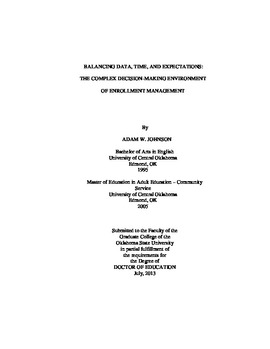| dc.contributor.advisor | Kearney, Kerri | |
| dc.contributor.author | Johnson, Adam W. | |
| dc.date.accessioned | 2014-09-24T14:16:59Z | |
| dc.date.available | 2014-09-24T14:16:59Z | |
| dc.date.issued | 2013-07 | |
| dc.identifier.uri | https://hdl.handle.net/11244/11023 | |
| dc.description.abstract | As a growing entity within higher education organizational structures, enrollment managers (EMs) are primarily tasked with projecting, recruiting, and retaining the student population of their campuses. Enrollment managers are expected by institutional presidents as well as through industry standards to make data-driven planning decisions to reach their goals. However, despite the availability of data, some enrollment managers revealed a different reality from traditional, rational decision-making models. This study explored the factors that contributed to or influenced the decision-making process of six enrollment managers working in either two or four-year public colleges and universities located in the Midwestern United States. Interviews, including a word association exercise, documents and artifacts of tools utilized to make enrollment management decisions, and observational field notes were gathered and analyzed in this qualitative study grounded in constructionism. Using the theories of Bounded Rationality and the Garbage Can model as lenses, EMs in this study seemed to reflect a highly stressful, competitive, and complex environment where rational decision-making gave way to satisficing, or "good-enough" decisions as expectations to meet enrollment goals governed their motives. Decisions also appeared to be closely associated to the Garbage Can Model due to the ambiguity of goal setting and the mixture of participants, problems, and solutions where temporal proximity appeared to be more of a factor in terms of what received attention first. With multiple interruptions into an EM's daily schedule, the ability for the enrollment manager to maintain consistent efforts on desired projects and plans was severely hindered. Enrollment managers in this study shared through multiple examples that they did not feel they had enough time to accomplish their tasks as thoroughly as they preferred and often addressed their problems without full consideration of all possible options, much less the optimal one. | |
| dc.format | application/pdf | |
| dc.language | en_US | |
| dc.rights | Copyright is held by the author who has granted the Oklahoma State University Library the non-exclusive right to share this material in its institutional repository. Contact Digital Library Services at lib-dls@okstate.edu or 405-744-9161 for the permission policy on the use, reproduction or distribution of this material. | |
| dc.title | Balancing data, time, and expectations: The complex decision-making environment of enrollment management | |
| dc.contributor.committeeMember | Harris, Ed | |
| dc.contributor.committeeMember | Mendez, Jesse | |
| dc.contributor.committeeMember | Ausburn, Lynna | |
| osu.filename | Johnson_okstate_0664D_12830.pdf | |
| osu.accesstype | Open Access | |
| dc.type.genre | Dissertation | |
| dc.type.material | Text | |
| thesis.degree.discipline | Higher Education | |
| thesis.degree.grantor | Oklahoma State University | |
